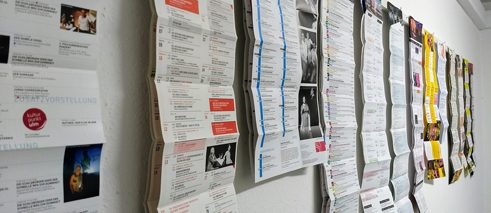Behind the scenes
Berlin
Over the past six months, I’ve had the pleasure of auditioning in Germany and Austria for agents, project work, an opera studio, and several full-time roles with opera houses. From singing in a tiny carpeted studio to the mainstage of an opera house, auditions come in all shapes and sizes.
 Theater Koblenz will always have a place in my heart as my first audition for a German opera house. | © Imogen Thirlwall
There are many stories, shared between performers as badges of honour. You might travel ten hours by train to sing for five minutes. A panel of creatives, administrators and colleagues judging your performance will, at best, look bored. At worst, eat an apple loudly. And the inevitable “vielen Dank” – don’t call us, we’ll call you.
Theater Koblenz will always have a place in my heart as my first audition for a German opera house. | © Imogen Thirlwall
There are many stories, shared between performers as badges of honour. You might travel ten hours by train to sing for five minutes. A panel of creatives, administrators and colleagues judging your performance will, at best, look bored. At worst, eat an apple loudly. And the inevitable “vielen Dank” – don’t call us, we’ll call you.
 Going into auditions, you can never be sure you’ll have time or a space to warm up your voice. Cue: singing into a scarf with this pretty wonderful view. | © Imogen Thirlwall
Preparation for auditions
Going into auditions, you can never be sure you’ll have time or a space to warm up your voice. Cue: singing into a scarf with this pretty wonderful view. | © Imogen Thirlwall
Preparation for auditions
Moving halfway across the world and attempting to find work in a highly-saturated, competitive market has been an incredible experience. How do you find jobs to apply for, let alone win auditions?Job advertisements are primarily posted online; various subscription services collate job postings into online platforms, such as “The Opera Stage”. To apply for work, singers submit a CV and cover letter outlining professional experience alongside audio and video recordings. Opera companies will then pre-screen from hundreds of applicants to select who they want to hear for live auditions.
 Examples of the monthly performance schedules of various theatres | © Imogen Thirlwall
To prepare, it’s standard practice to have an “audition package” ready to go – that is, five or six arias (songs from operas) reflecting stylistic and emotional variety that showcase your vocal qualities and artistic personality while being an appropriate and commercially viable fit for your age, vocal weight, physical appearance and so forth – the list goes on!
Examples of the monthly performance schedules of various theatres | © Imogen Thirlwall
To prepare, it’s standard practice to have an “audition package” ready to go – that is, five or six arias (songs from operas) reflecting stylistic and emotional variety that showcase your vocal qualities and artistic personality while being an appropriate and commercially viable fit for your age, vocal weight, physical appearance and so forth – the list goes on! An example of a dialogue excerpt from Mozart’s “Die Zauberflöte”. | © Imogen Thirlwall
Depending on the audition, there are any number of additional components in German: dialogue to memorise, excerpts from opera choruses or choral pieces, compulsory arias, sight-reading tests, and interviews.
An example of a dialogue excerpt from Mozart’s “Die Zauberflöte”. | © Imogen Thirlwall
Depending on the audition, there are any number of additional components in German: dialogue to memorise, excerpts from opera choruses or choral pieces, compulsory arias, sight-reading tests, and interviews.
Behind the scenes
Auditions are a test in your ability to hold your own. You will be thrown into some level of pre-audition chaos. It’s likely you’ll spend three hours sitting on the floor in a hallway with every other soprano called to be heard that day. There will be big personalities, a lot of noise, and often no pre-performance luxuries, such as meeting your pianist in advance, or having a quiet space to warm to up your voice or gather your thoughts.There is a lot about the lead-up to an audition that is very isolating. It is lonely working individually in a practice room on repertoire. It takes extreme resourcefulness to be able to afford precious hours of vocal tuition and fund audition travel costs. I deeply miss the sociability of classroom learning now that I continue my German tuition with a private tutor. All in all, it takes significant individual work to prepare for every audition.
 Through to the final round of auditions for a position with Meininger Staatstheater, I had the opportunity to sing on the mainstage. | © Imogen Thirlwall
There is a feast of emotion that plays out behind the scenes. No matter how hard we try to play it cool, every singer hopes that this next audition will be “the one” to provide the foot in the door. It all boils down to that wonderful reason we put ourselves through it: for the chance to collaborate with others in making and sharing music.
Through to the final round of auditions for a position with Meininger Staatstheater, I had the opportunity to sing on the mainstage. | © Imogen Thirlwall
There is a feast of emotion that plays out behind the scenes. No matter how hard we try to play it cool, every singer hopes that this next audition will be “the one” to provide the foot in the door. It all boils down to that wonderful reason we put ourselves through it: for the chance to collaborate with others in making and sharing music.Going into an audition room is scary; you’re entirely vulnerable. But then you get to sing your guts out. And that’s the best part.
